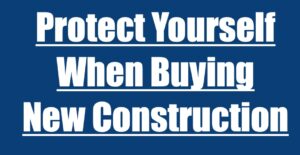Protect Yourself When Buying New Construction
Protect Yourself:
Any home purchase is a significant investment; buying a brand-new home is no different. You should know how to protect yourself when buying new construction. Protect yourself by thoroughly researching the builders you are considering, and hiring a qualified independent inspector and a qualified buyer broker should seriously be considered.
builders you are considering, and hiring a qualified independent inspector and a qualified buyer broker should seriously be considered.
Stages of Construction: There are four primary stages of any residential construction project:
- Foundation: This stage includes excavation, footings, foundation walls or slab, waterproofing, backfill, compaction, and underground rough plumbing and electrical.
- Framing: This stage includes the wood or steel framing, exterior walls and roof sheathing, exterior trim and siding, windows, doors, and roofing.
- Rough plumbing and electrical: This stage includes water, waste, and vent piping, rough electrical, rough mechanical, ductwork, wiring, and electrical panel installation.
- Finishing: This stage includes flooring, cabinets, millwork, countertops, tile, mirrors, electrical trim, plumbing trim, and mechanical.
City Inspections are generally required during the different stages of construction to “ensure the life, health, safety, and welfare of the public.” However, even if something is missed, the ultimate responsibility for building the home to code belongs to the builder.
Protect Yourself When Buying New Construction
One great way is to hire your independent inspector to conduct periodic inspections during the different construction phases. Unlike an inspection of an existing home, the inspector will have to visit the site multiple times during the process. For that reason, construction inspections are more expensive.
When hiring an inspector for new construction, ask at what stages of the construction process they inspect. A typical new construction inspection might be at the end of the foundation stage, another at the end of the framing and rough plumbing, electrical, and mechanical, and the final inspection after the home is completed.
The sales contract should include a provision allowing a buyer to hire an independent inspector. Your buyer broker can not only help you get that included but assist in negotiating any issues arising from the periodic inspections.
Purchase a Third Party Home Warranty Company. It may be wise also to consider purchasing a home warranty, particularly after whatever warranty timeline the builder is offering is about to expire. Home Warranties have different levels of coverage and typically last for a one-year term that can be renewed annually. Be sure to do your due diligence when selecting a Home Warranty to help Protect Yourself When Buying New Construction.
Have a Buyer Broker and Realtor representing you. All too often, buyers of new construction homes enter the model or builder showroom without a Realtor and Buyer Broker representing them. It’s important to know that the builders’ salespeople work for the builder, period! Their obligation is to their employer. Don’t go it alone; hire a buyer broker and get the professional representation you need to Protect Yourself When Buying New Construction.
Conclusion: By researching and hiring a qualified independent inspector, you can protect yourself when buying new construction.
